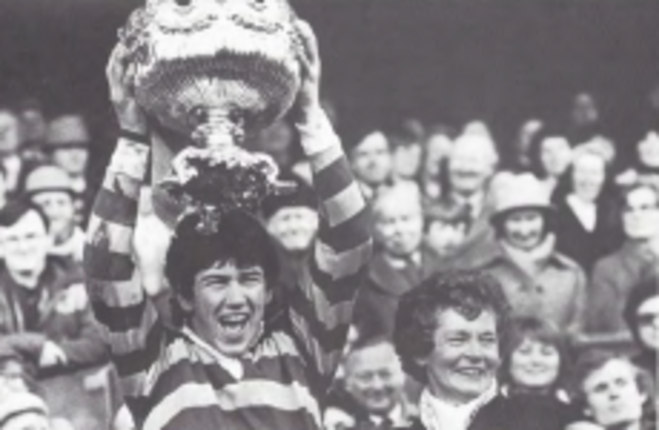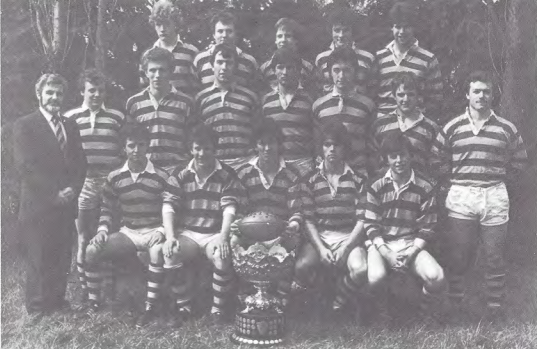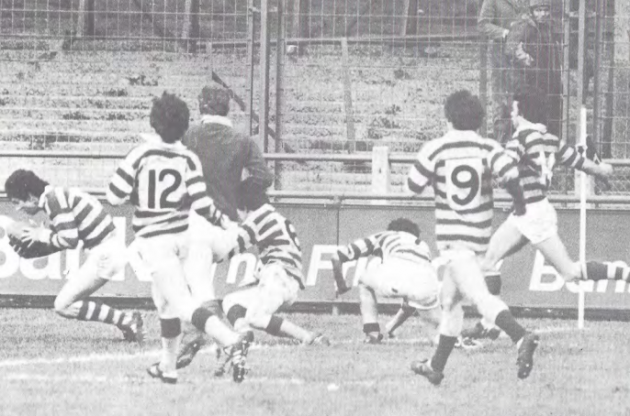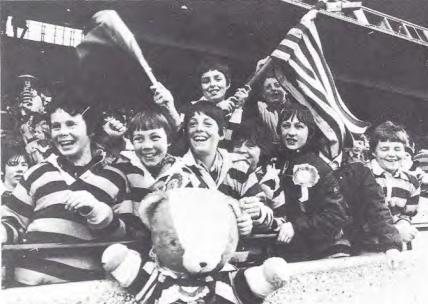SCHOOLS RUGBY CAN be a polarising entity. For some, it is a talent-laden breeding ground where future internationals are moulded in a gladiatorial atmosphere of one-and-done knockout rugby.
For others, it symbolises a lot of what is wrong with Ireland, with the wealthy schools divvying up the top talent between them.
But regardless of whether you are a zealot at either end of that spectrum, tradition is the defining characteristic of schools rugby, particularly in Leinster.
The team that lifted the first trophy back in 1887 is the same team that hoisted it last year. And when Blackrock aren’t adding another chalice to their overflowing trophy cabinet, one of the other traditional powerhouses are stepping in to rent the cup for a year or two.
So when a team outside of the established order – outside of the ‘big six’ – comes along and breaks their stranglehold on the competition, it can’t help but be memorable.
And for four years in the 1980s, De La Salle Churchtown did just that.
De La Salle won cups in 1983 and 1985 and contested another decider in 1986. That sort of consistency would be noteworthy if Blackrock achieved it – the thing that makes De La Salle’s feat all the more impressive is that they are the only non-fee paying school to reach the summit of the Leinster Schools Senior Cup mountain in the last 80 years.
That fact isn’t lost on former Ireland centre Brian Glennon, who played on both of those cup-winning teams.
“Somebody reminded me the other day that De La Salle Churchtown are actually the only non-fee paying school to ever win the Leinster Schools Senior Cup,” Glennon said.
“We were conscious of that fact. Usually the teams that did well were the fee-paying schools who would probably have been from a traditional middle-class background. We only had one and a half pitches at our school so even facility-wise we would have been behind.”
De La Salle had contested senior cup finals in 1968 and 1975 but had been beaten both times. Despite those near-misses, nothing exceptional was expected from the 1983 team.
Their season played out like France’s staggering revival to reach the 2011 World Cup final. It would have been hard to imagine St Patrick’s Day success halfway through the ’83 season.
“It was very unusual in 1983 because we had played 20 games in pre-season and only won four so it was hugely unexpected,” Glennon said.
“We weren’t even considered a contender but some of the bigger teams knocked each other out and we probably had an easier draw.”
There was some talent on the team though – Glennon was a 15-year-old out-half while they had three Ireland Schools internationals in captain Michael McArdle at centre, hooker Niall Muldowney and Mark Feely at flanker.
After beating Newbridge, St Gerrard’s and Roscrea, Castleknock stood in the way in the final. A key moment in the game came when Glennon found McArdle in the corner for a try, and De La Salle held on to make history.
“It was absolutely massive and we went around to the different classrooms with the cup and you saw more kids out playing rugby,” Glennon said.
“I was only 15 and in fourth year at the time so it kind of passed me by. I didn’t realise the significance of it.”
Two years later was a different story for Glennon. This time the team only lost two games in pre-season and were on everybody’s hit-list. Glennon was a centre that year, and captained his team against Blackrock in the final – it was the epitome of private school v the non-fee paying outliers.
“I remember the night before the final one of the guys standing up and saying, ‘when we lost to them at juniors, I was in awe of Blackrock. But I’m not anymore’,” Glennon said.
“We thought we could go out there and beat them.”
That Blackrock side contained Alain Rolland but De La Salle eked out a 10-6 win. It wasn’t lost on Glennon that his small school from Dublin 14 had schools rugby’s pre-eminent ogre.
“I always say that we had a double victory that day,” Glennon said.
“We won the cup, for one. But we beat Blackrock too, which was huge.”
Those were the days where newspapers sent their main rugby correspondents to cover the final and Con Houlihan felt the 1983 showpiece was worthy of one of his majestic back-page columns.
Glennon remembers the photo of himself lifting the cup appearing in the paper.
“I remember my mother had to borrow a fur coat,” he said with a laugh.
“My mother was well turned out but she didn’t own a fur coat. I’m sure the mothers of the captains from the more traditional schools definitely owned fur coats.”
Glennon wasn’t around the following year when the school made it back to yet another final, this time losing 10-3 to Blackrock, but thinks that senior team were simply being sustained by the two cup victories.
“With respect to that 1986 team, I think they got there on the back of the lift that the school had gotten from the success of the previous few years,” Glennon said.
“They sort of lived off that.”
What makes De La Salle’s four-year period of success even more staggering was that it was so contained. The Churchtown region didn’t become a rugby stronghold as a result and the school has yet to appear in another St Patrick’s Day clash.
Glennon thinks the days where schools like his could compete at the top table are probably at an end.
“I find it hard to see De La Salle Churchtown getting back there,” Glennon said.
“The primary school is closed now and parents have stopped sending their kids there as much as they once did.”




